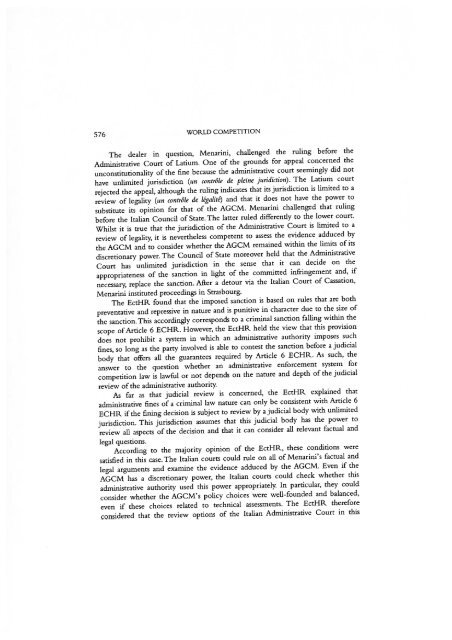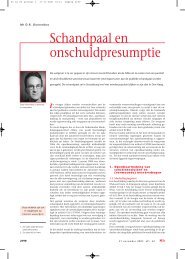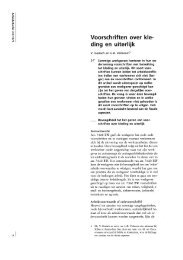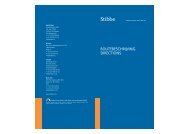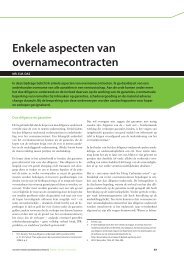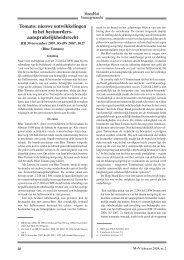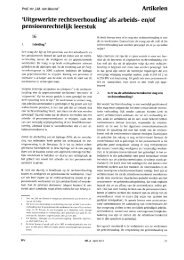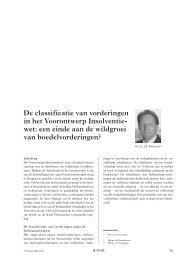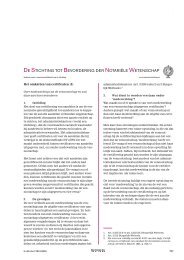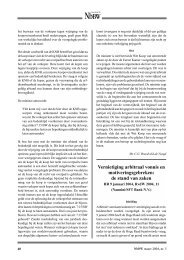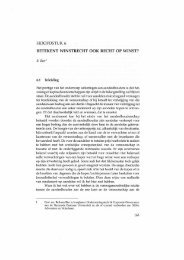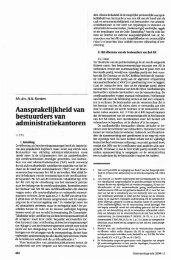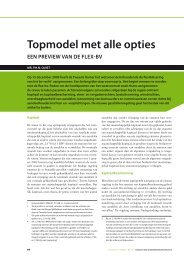The Lawfulness and Acceptability of Enforcement of ... - Stibbe
The Lawfulness and Acceptability of Enforcement of ... - Stibbe
The Lawfulness and Acceptability of Enforcement of ... - Stibbe
Create successful ePaper yourself
Turn your PDF publications into a flip-book with our unique Google optimized e-Paper software.
Administrative Court <strong>of</strong> Latium. One <strong>of</strong> the grounds for appeal concerned the<br />
<strong>The</strong> dealer in question, Menarini, challenged the ruling before the<br />
576 WOPLD COMPETITION<br />
Whilst it is true that the jurisdiction <strong>of</strong> the Administrative Court is limited to a<br />
review <strong>of</strong> legality; it is nevertheless competent to assess the evidence adduced by<br />
the AGCM <strong>and</strong> to consider whether the AGCM remained within the limits <strong>of</strong> its<br />
substitute its opinion for that <strong>of</strong> the AGCM. Menarini challenged that ruling<br />
before the Italian Council <strong>of</strong> State. <strong>The</strong> latter ruled differently to the lower court.<br />
review <strong>of</strong> legality (un contróle de 1éa1ite’) <strong>and</strong> that it does not have the power to<br />
rejected the appeal, although the ruling indicates that its jurisdiction is limited to a<br />
have unlimited jurisdiction (un contróle de pleine juridiction). <strong>The</strong> Latium court<br />
unconstitutionality <strong>of</strong> the fine because the administrative court seemingly did not<br />
discretionary power. <strong>The</strong> Council <strong>of</strong> State moreover held that the Administrative<br />
Court has unlimited jurisdiction in the sense that it can decide on the<br />
necessary, replace the sanction. After a detour via the Italian Court <strong>of</strong> Cassation,<br />
appropriateness <strong>of</strong> the sanction in light <strong>of</strong> the committed infringement <strong>and</strong>, if<br />
Menarini instituted proceedings in Strasbourg.<br />
preventative <strong>and</strong> repressive in nature <strong>and</strong> is punitive in character due to the size <strong>of</strong><br />
the sanction. This accordingly corresponds to a criminal sanction falling within the<br />
does not prohibit a system in which an administrative authority imposes such<br />
scope <strong>of</strong> Article 6 ECHR. However, the EctHR held the view that this provision<br />
fines, so long as the party involved is able to contest the sanction before a judicial<br />
jurisdiction. This jurisdiction assumes that this judicial body has the power to<br />
body that <strong>of</strong>fers all the guarantees required by Article 6 ECHR. As such, the<br />
competition law is lawful or not depends on the nature <strong>and</strong> depth <strong>of</strong> the judicial<br />
answer to the question whether an administrative enforcement system for<br />
review <strong>of</strong> the administrative authority.<br />
ECHR if the fining decision is subject to review by a judicial body with unlimited<br />
administrative fines <strong>of</strong> a criminal law nature can only be consistent with Article 6<br />
considered that the review options <strong>of</strong> the Italian Administrative Court in this<br />
legal questions.<br />
review all aspects <strong>of</strong> the decision <strong>and</strong> that it can consider all relevant factual <strong>and</strong><br />
AGCM has a discretionary power, the Italian courts could check whether this<br />
legal arguments <strong>and</strong> examine the evidence adduced by the AGCM. Even if the<br />
satisfied in this case. <strong>The</strong> Italian courts could rule on all <strong>of</strong> Menarini’s factual <strong>and</strong><br />
administrative authority used this power appropriately. In particular, they could<br />
even if these choices related to technical assessments. <strong>The</strong> EctHR therefore<br />
consider whether the AGCM’s policy choices were well-founded <strong>and</strong> balanced,<br />
<strong>The</strong> EctHR found that the imposed sanction is based on rules that are both<br />
As far as that judicial review is concerned, the EctHR explained that<br />
According to the majority opinion <strong>of</strong> the EctHR, these conditions were


